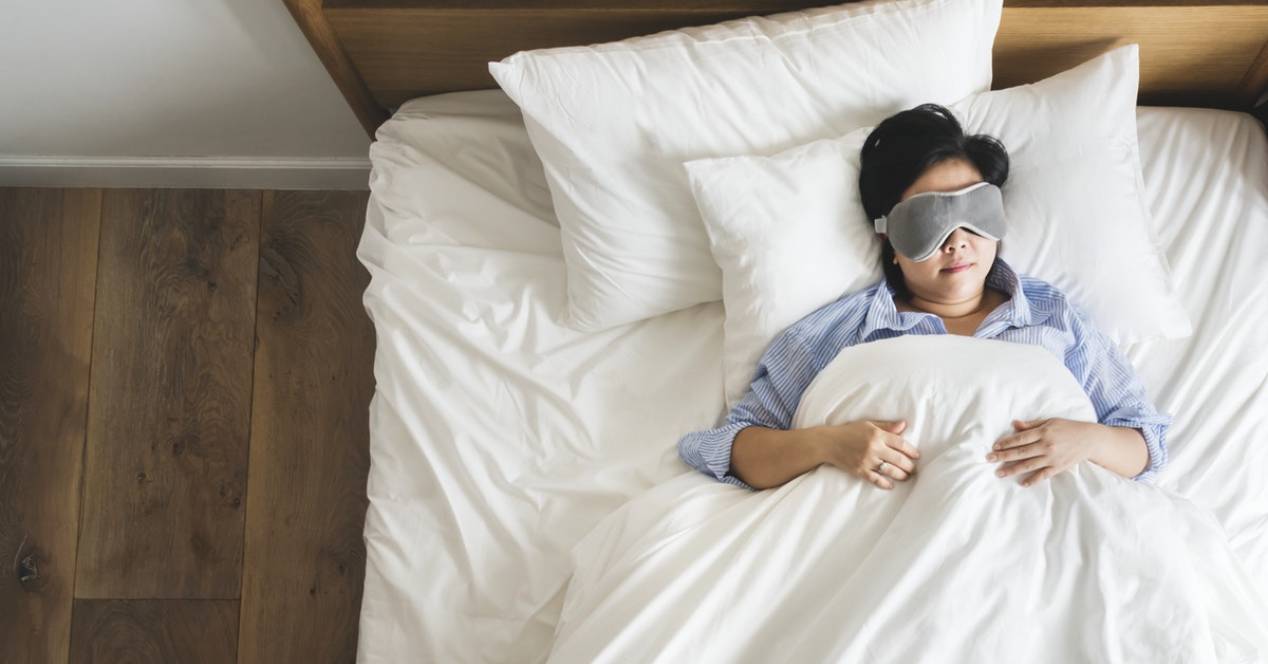
We all know how important it is to get enough sleep every night, as rest not only keeps you on top of your workout, but also keeps your heart, brain, and metabolism in check. However, it is usually not so easy to say goodbye to dark circles, which makes many of us look for solutions to sleep better. A good example is the melatonin supplement.
Melatonin is a sleep aid supplement that many turn to when they have trouble getting a rest at night. But does it really work? And most importantly, is it safe to consume?
What is melatonin?
Melatonin is a hormone that the body produces naturally. It is produced by the pineal gland in the brain, but is also found in other areas, such as the eyes, bone marrow, and intestine.
It is commonly called the sleep hormone, as high levels can help us fall asleep. However, melatonin itself will not knock us out. It simply lets your body know that it is night so you can relax and fall asleep more easily.
Melatonin supplements are popular among people with insomnia and jet lag. We can buy melatonin supplements without a prescription in many countries. In addition to its sleep benefits, this hormone has strong antioxidant and anti-inflammatory effects. It also helps regulate body temperature, blood pressure, blood glucose, body weight, and the levels of some hormones.
Melatonin levels begin to rise as night falls, signaling to the body that it is time to sleep. They then decrease in the morning, when it is light outside, to promote wakefulness.
Many factors can cause low melatonin levels at night, including alcohol use, smoking, caffeine use, shift work, aging, certain medications, and exposure to too much light at night, including blue light. .
Melatonin Uses
This substance helps us get our circadian rhythms back to working properly.
Mainly, it is used as a treatment for sleep disorders, since it helps us reduce the time it takes us to fall asleep, as well as improve its quality.
Some sleep disorders for which melatonin is used are the following:
- acute insomnia.
- Chronic insomnia.
However, it can also be used in the case of people with disturbed circadian rhythms (jetlack, change of hours at work...), as well as in the elderly.
On the other hand, the effect of melatonin is known for a role of neuroprotective, since it has a great antioxidant power. In some studies it has been observed that it prevents the development of neurodegenerative diseases such as Alzheimer's.
Furthermore, it could be linked to the weight control, since the lack of secretion of this substance will cause sleep disorders, which we know will affect certain hormones such as the thyroid.
Natural sources of melatonin
Some of the foods that stand out the most in melatonin content are:
- Walnuts. 3-4 ng for each gram.
- Tomatoes. 3-114ng per gram.
- Cherries. It contains approximately 13ng per gram.
- Strawberries. 1-11 ng per gram.
In addition, some plants also contain a certain amount:
- Cicadae. 3,7 mcg/g.
- Babreum cosclea. 2,2mcg/g.
- Uncaria rhynchophylla. 2,2mcg/g.
- Phellodencrom amurense. 1,2mcg/g.
In these sources there is little amount of melatonin. Therefore, if we have sleep problems and want to regulate our circadian rhythms, it is likely that we will have to use a melatonin supplement.
Does it work for sleep?
Melatonin is a hormone that is produced naturally by your brain, in a gland called pineal. While everyone's brain produces its own individual base amount of this hormone, this amount increases to about 10 times normal about two hours before bedtime to help your body wind down and prepare for sleep.
However, not everyone goes to bed at the same time. We each have different internal clocks, which calculate our sleep cycles. These rhythms are formed over time due to the schedule you have created for yourself. There are people who are naturally night owls or morning birds, but the schedule plays a big role.
Strong evidence suggests that taking melatonin before bed decreases sleep latency (the time it takes you to fall asleep) while increasing your total sleep time. Taking melatonin before bed was shown to reduce sleep latency by almost three minutes and increase total sleep time by approximately 30 minutes, compared to a placebo.
Additionally, melatonin can counter jet lag, a temporary sleep disorder. Jet lag occurs when the body's internal clock is out of sync with a new time zone. Shift workers may also experience symptoms of jet lag because they work during hours that are normally used for sleep.
However, before trying this supplement, it is best to implement healthy sleep habits, such as establishing a consistent sleep schedule, limiting alcohol and caffeine intake, and reducing exposure to light and electronic devices before bed.

Other advantages
In addition to improving sleep, melatonin may provide other health benefits.
Improve eye health
Healthy levels of indole-derived melatonin can support eye health. This is because this hormone has powerful antioxidant effects that can reduce the risk of eye diseases, such as age-related macular degeneration (AMD).
In fact, one review concluded that melatonin supplements may reduce macular degeneration by neutralizing free radicals and decreasing inflammation.
Treat acid reflux and GERD
Melatonin can help relieve acid reflux and gastroesophageal reflux disease (GERD) by protecting the lining of the esophagus, the tube that connects the throat and stomach, against irritants such as acid, alcohol, and nonsteroidal anti-inflammatory drugs.
One study showed that taking melatonin inhibits an enzyme system that damages the epithelial barrier of the esophagus, which is responsible for protecting the deeper layers of the esophagus from damage. Damage to the esophageal epithelial barrier is known to cause acid reflux and GERD and can eventually lead to more serious health complications such as cancer.
Reduce tinnitus symptoms
Tinnitus is a problem characterized by ringing in the ears. It is usually worse when there is less background noise, such as when we are trying to fall asleep.
Interestingly, researchers suggest that taking melatonin may help significantly reduce tinnitus symptoms and improve sleep. One study concluded that the use of melatonin alone or together with tinnitus medication can control tinnitus and improve sleep.
Relieve migraine attacks
A migraine attack is a recurring type of headache that causes intense, throbbing pain or a throbbing sensation, often on one side of the head. Several prescription medications help treat migraine headaches, but melatonin can also offer relief due to its ability to inhibit pain sensations.
A different review of 25 studies found similar results, suggesting that taking 3 mg of melatonin at bedtime reduces migraine frequency in adults.
Recommended dosage
Still, many people have difficulty sleeping, either to fall asleep or to sleep peacefully through the night. That's when people turn to sleep aids like melatonin supplements.
This is an over-the-counter dietary supplement, and it is approved, but not regulated. That is, it is difficult to know what the exact dose of melatonin you are taking is, since the supplement formula may have other additional ingredients. Although 0 to 1 milligrams of melatonin a day will help you sleep better, most people tend to take much higher doses, approximately 5 mg or 10 mg.
Super high doses can desensitize the brain to melatonin supplements, which may cause you to need more to get the same effects.
A landmark study from the Massachusetts Institute of Technology (MIT) found that one of these supplements is most effective at a dose of 0 mg. Another MIT-led study, published in the journal Sleep Medical Reviews, found that high doses of commercial supplements taken for long periods of time are less effective in helping you sleep and can cause side effects, such as low body temperature and feeling of discomfort.
It is recommended to consume melatonin 30 minutes before going to bed. The amounts to take may vary according to the response of each individual, since there are people who respond with a low dose, while others will have to take a slightly higher dose to have the same effects. The recommended dose is 0,5 mg to 5 mg.
Knowing that melatonin is not dose dependent, if you are including a dose that exceeds your minimum threshold, it will be effective. Therefore, we can conclude that: "If you take more melatonin, it will not have a greater effect." Besides, this makes this supplement a safe supplement, since it no more and more doses are needed.
In addition, melatonin supplementation will not have an impact on the endogenous production of our body. It does not generate physical or mental dependence.

Creates addiction?
Current evidence suggests that melatonin supplements are safe, non-toxic, and non-addictive for both children and adults. Long-term supplementation is also probably safe. Studies have found no significant adverse events associated with taking melatonin 2 to 10 mg daily for up to 3,5 years.
Unlike other hormones, no evidence suggests that taking melatonin affects the the body's natural ability to produce it. However, several minor and short-lived side effects of melatonin supplements have been reported. Some examples are daytime sleepiness, fatigue, dizziness, headaches, nausea, and a feeling of cold.
Short-term use of melatonin supplements appears to be safe for most adults and children. However, information on the long-term effects of melatonin supplements is limited. Some studies have indicated that long-term use of melatonin in adults may cause mild side effects compared to a placebo. Studies on the effects of long-term use of melatonin in children remain limited.
Just because something is "natural" does not automatically make it "safe." Even though there is no evidence that melatonin is addictiveWhen taking medications or supplements, it is always good to be aware of the potential effects of the substance.
Melatonin does not cause withdrawal or dependence symptoms, unlike other sleep medications. It also doesn't cause a sleep "hangover" and you don't develop a tolerance to it. In other words, it doesn't make us need more as time goes by, which is a hallmark of addiction. These characteristics make melatonin unlikely to be addictive. However, more long-term research is needed on melatonin and the effects of long-term use.
Does it work the same in young people?
However, it is worth noting that these studies were conducted in people 50 years of age or older. That's because melatonin levels naturally decline as we age (usually once we hit our 50s or 60s).
Younger people shouldn't see that decline. Melatonin supplements don't usually work for young people because they don't need them, which means that people under the age of 50 should not have an insufficient amount.
Instead, sleep problems in people under 50 are usually caused by other issues, such as stress, sleep apnea, or exposure to blue light (from phones and devices) before bed. Many times, the use of the screen is the problem. When you expose your brain to light that can cause insomnia, you will reduce the amount of melatonin you have. Once levels drop, it's hard to get them back to optimal sleep.
Having a bright light right in front of your face has the negative effect of making your brain think the sun is still out, so you must be awake. Ideally, try not to use any electronic devices after the sun goes down, and if you can help it, don't keep your phone in your bedroom while you sleep, as it emits a small amount of blue light even when the screen is locked.

efectos secundarios
There are some consequences of regularly taking melatonin supplements.
The brain thinks it's night
When you add supplements to your nightly routine, your brain responds just as it would with its own melatonin production. The hormone (even in pill form) tells your brain that the sun has set and it's time to sleep.
Melatonin levels naturally rise about two hours before bed. Contrary to common understanding, melatonin doesn't actually help you sleep, but puts your brain in a state of silent wakefulness. In other words, it helps keep your body on a regular schedule.
Sleep schedule restarts
Natural melatonin tells your brain that it is nighttime and therefore time to go to sleep. So when you take supplements at a different time, your circadian rhythm changes, which is why jet lag pills are so commonly used.
Although she doesn't recommend that people use melatonin too often, it can be helpful when traveling to a new time zone or adjusting to a new night work schedule, for example. When taken at a suitable time (an hour or two before bedtime), the supplements can help your body acclimatize and naturally fall asleep at a new time.
But the goal here is to use supplements to help adjust to a new schedule, not to use it every night. It's like crutches for a broken leg: you use them briefly until your leg can bear weight on its own again.
Body temperature can change
The part of your brain that controls your circadian rhythm and natural melatonin production (that's your suprachiasmatic nucleus, to be precise) is also responsible for regulating your core body temperature, according to a small April 2019 study in the Journal of Pineal. research.
Your body temperature generally rises as the sun goes down and peaks at night, which is also when your melatonin levels are highest, according to the aforementioned study. After giving 10 people a 5-milligram melatonin supplement, the researchers saw an increase in body temperature, indicating that the supplement essentially did its job.
But since your levels affect your body's temperature regulation, and changes in body temperature correlate with your alertness, you want to make sure you take the supplement wisely.